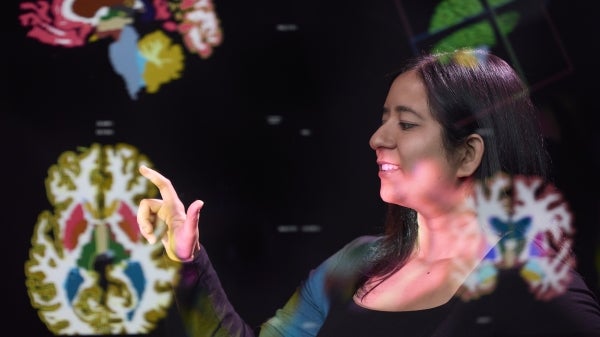First-generation college student wins Goldwater Scholarship to further sustainable engineering research

Kaleigh Johnson
Ira A. Fulton Schools of Engineering chemical engineering student Kaleigh Johnson wants to use engineering to make the world a more sustainable place. Her extensive research efforts in her first three years at Arizona State University have earned her one of four Barry M. Goldwater Scholarships awarded to students in Arizona.
“As a first-generation college student, gaining national recognition for my accomplishments at ASU is an honor beyond what my family and I thought possible,” Johnson said.
As a student in Barrett, the Honors College at ASU, she has no shortage of accomplishments to be proud of, and as a Goldwater Scholar her future just got brighter. The undergraduate award covers tuition, fees, books, and room and board up to $7,500 per year to students pursuing a research career in engineering, science or math.
The choice of pursuing chemical engineering came easy to Johnson as it combined her favorite subjects of chemistry, math and physics in a versatile field that could take her anywhere.
She plans to pursue a doctorate in chemical engineering before working in industry.
“I want to implement synthetic biology into the production of chemicals and fuels,” Johnson said. “I hope to make a significant impact in improving the sustainability of industrial manufacturing.”
Taking advantage of research, innovation and entrepreneurial opportunities at ASU
Johnson’s engineering hero takes the form of an intellectual leader and dedicated engineer: Dagny Taggart, heroine and protagonist of Ayn Rand’s “Atlas Shrugged.”
“I admire her for her strength, ability to lead effortlessly and passionate desire for progress and innovation,” Johnson said.
Like her hero, Johnson is dedicated to leading the innovation of sustainable industrial engineering.
Meeting the challenge of worldwide sustainability requires academic and entrepreneurial skills. Johnson is taking on this challenge with a minor in engineering management and participation in two Fulton Schools programs: the Grand Challenge Scholars Program (GCSP) and Engineering Projects in Community Service (EPICS). These programs increase her chemical and sustainability engineering knowledge as well as her leadership skills.
Through GCSP she is gaining the skills needed to tackle 21st-century global issues in sustainability through research and coursework. She credits lecturer Amy Trowbridge, who teaches the introductory course for GCSP, as an instrumental faculty member who helped her grow as a student. Through Trowbridge she was introduced to industrial biotechnology as a channel for her sustainability interests. Trowbridge was also key to Johnson developing leadership, public speaking and communication skills through a teaching assistantship and GCSP Summer Institute counselor positions in the program.
“The most significant knowledge I gained through working with Amy was learning how engineers learn,” Johnson said. “This knowledge has helped me to be a better leader and to more effectively communicate with my peers while working on collaborative projects.”
Her participation in four semesters of EPICS also led to lessons in teamwork, leadership and the engineering design process from another influential faculty member, lecturer and EPICS director Scott Shrake.
“Scott gave me the opportunity to start my own project, GreenAir, to design and build a renewable air compressor,” Johnson said. “He gave me feedback along the way and the freedom to learn from my own mistakes. This experience was extremely helpful in giving me hands-on experience in a complex engineering project and teaching me how to lead and motivate a team of engineers from week to week.”
She is furthering her chemical engineering knowledge and contributing to the progress of sustainable industrial engineering practices through research in synthetic biology — using microorganisms to produce compounds and materials for industry — under assistant professor David Nielsen as part of the Fulton Undergraduate Research Initiative (FURI).
University-wide support makes college a positive experience
Studying at ASU has been a rewarding experience even before day one. As part of the GCSP Summer Institute, Johnson stayed in the Barrett residence halls for five days. During this experience she became excited for the first time that she would be attending ASU.
“Before the Summer Institute, attending ASU was just a decision — it was close to home and family — but staying in the dorms, meeting engineering faculty and making friends with other new ASU students turned that decision into an exciting new reality,” Johnson said.
It can be a challenge to distinguish oneself among 19,000 students in the Fulton Schools, but being part of a large engineering community and even larger university community also provides the advantage of the robust resources and opportunities to engage with like-minded colleagues.
“The most rewarding aspect of attending ASU is the freedom to engage with scholars of every discipline who share your interests,” Johnson said. “I’ve enjoyed being involved in sustainability through organizations that span the Ira A. Fulton Schools of Engineering, the School of Sustainability and the W. P. Carey School of Business.”
Achieving goals and creating new ones beyond engineering at ASU
Johnson’s studies in sustainability have taken her outside ASU and the country to achieve one of her lifelong dreams through the US-UK Fulbright Commission’s Summer Institutes.
“Traveling to Europe was a goal I have had nearly my entire life, but one that I could not afford on my own,” Johnson said. “During the Fulbright Summer Institute I was able to spend an entire month at the University of Exeter studying climate change and meeting students from around the world who share my interests in sustainability.”
She hopes that her career will allow her to travel frequently so she can explore new fields of sustainability, experience a wide variety of cultures and seek new adventures in places she has never been.
While finding ways to unwind between research and coursework, she also discovered a love of artistic lettering and calligraphy that she’s developing into a side business.
Though she has found a creative outlet to balance herself, engineering is her passion and as an engineer she believes she is part of world-changing profession.
“I believe engineering has always and will continue to change the world,” Johnson said. “As our scientific knowledge continues to expand, engineers will continue to find new applications of this knowledge to improve the world and potentially change how we think, behave and interact.”
More Science and technology

Podcast explores the future in a rapidly evolving world
What will it mean to be human in the future? Who owns data and who owns us? Can machines think?These are some of the questions…

New NIH-funded program will train ASU students for the future of AI-powered medicine
The medical sector is increasingly exploring the use of artificial intelligence, or AI, to make health care more affordable and…

Cosmic clues: Metal-poor regions unveil potential method for galaxy growth
For decades, astronomers have analyzed data from space and ground telescopes to learn more about galaxies in the universe.…